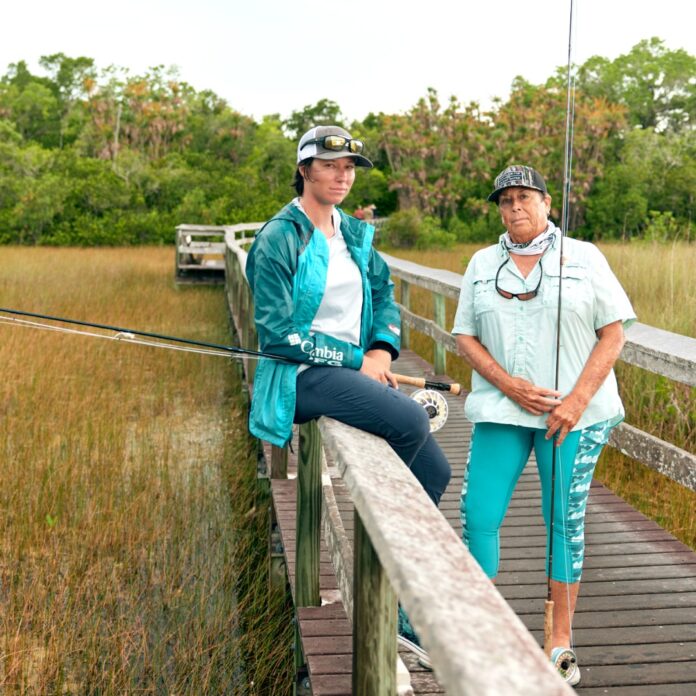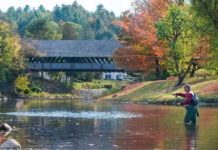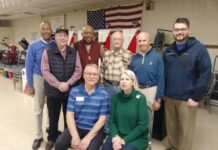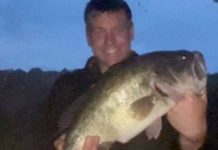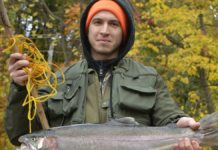It’s objectively not a good day for fishing, but you could never tell from the look on Betsy Bullard and Wesley Locke’s faces. It’s a muggy July morning, and Bullard, 65, and Locke, 28, sit perched on the sides of the skiff, completely unbothered by the less-than-ideal weather whirling around us. Sinister black clouds are piling up in the sky to our right and left, with the occasional lightning bolt reaching down to kiss the mangroves in the distance. Mother Nature is showing off her formidable side here in the farthest reaches of Everglades National Park. We’re launching from Flamingo Marina, the southernmost (accessible) point of the national park. As we load up the boat in preparation for a day of fly-fishing, Bullard and Locke are hoping that the influx of fresh water might make the tarpon happy. The dozens of manatees rolling in the marina like a Cajun crawfish boil seem to be.
The same can’t be said about Captain Benny Blanco. The full-time fishing guide makes his living running charters in and around the Everglades and spends the remainder of his time fighting for its restoration with Captains for Clean Water, a group of passionate guides and anglers from around the state. It’s clear Blanco doesn’t like what he sees. As he pulls out of the marina, he stands to scan the water beyond the mangroves. His eyebrows furrow. His mouth hardens into a line.
Blanco is trying to do what he does best—put us on tarpon the size of a surfboard and snook that’ll snap our line—but it seems our circumstances have soured, if his expression is any indication. It isn’t the raging skies pressing in from the east and west that have Blanco concerned, it’s the water gently lapping at the skiff.
“It’s not supposed to be green,” he says with an edge. “It’s not supposed to be green at all.”
Fresh Outta Water

Oh, but it’s green alright, like a sickly shade of split-pea soup. It’s the first visible sign of what Blanco has been talking about all morning. Before we ventured into this remote wilderness, we gathered at a Homestead Cracker Barrel, discussing the precarious predicament the Everglades has found itself in and the work that Captains for Clean Water has been doing to give this park a seat at the table in Tallahassee.
Blanco hardly touches his toast he’s so busy giving me the rundown on the environmental and political forces that are slowly strangling the swamp.
The Everglades’ troubles began back in the early 1900s, when the U.S. government constructed dikes, levees and canals to prevent Lake Okeechobee from overflowing during heavy rainfall. Not only did this attract new settlers who were assured they wouldn’t be swept away in a flood, but it also created fertile land perfect for growing sugarcane, rice and vegetables.
While these new dikes and levees were good news for growers in the sugar industry, they’ve led to some serious environmental repercussions in the Everglades and beyond. The resulting agricultural boom in the area surrounding Lake Okeechobee led to an influx of phosphate-laden farm runoff into the lake. Eventually, this water makes its way to the ocean via the Caloosahatchee River and the St. Lucie Canal, where its effects aren’t pretty. The high phosphorus levels in the water are partly to blame for the dramatic Red Tide events Floridians have seen over the past few years.
And the fallout trickles all the way down into the River of Grass—where it’s hardly a river at all anymore. With less water flowing south, the Everglades is being deprived of the fresh water it needs to remain balanced, and the result is all around us on this tempestuous summer morning.
So our first hunt of the day isn’t for tarpon or snook or redfish, it’s for cleaner water. As we charge through the flats, Blanco’s gaze flits from the radar on his phone to the unsatisfactory shallows. His expression is one of disappointment, like a father whose rebellious teenager has broken curfew, yet again. He’s seen this before, and he’s pretty sure he’ll see it again. I can tell he isn’t pleased with our prospects, but with storms squeezing us from either side, we don’t have the luxury of time to troll through Florida Bay in search of the perfect fishing spot. This will have to do.
This absence of freshwater is particularly painful to the environment as sea-level rise sends salinity levels soaring. These hypersalinity events wipe out huge beds of seagrass critical for supporting the diverse wildlife in the park. Suddenly, an ecosystem once teeming with wood storks, snail kites and snook is eerily quiet, and water that was once as clear as tequila is cloudy and discolored, much like it is today.
It’s not supposed to be green. It’s not supposed to be green at all.
— Benny Blanco
Blanco cuts the engine right at the edge of the dark cloud dumping sheets of rain in front of us and scrambles atop the poling platform. Meanwhile, Bullard and Locke begin a dance that’s second nature. Since we’re fly-fishing today, the duo takes turns casting. “Betsy first, always,” Locke tells me matter-of-factly. As Bullard takes her place on the bow, Locke climbs on top of the cooler to spot risers—what anglers call the fish just barely breaking the surface of the water. Locke’s hoping to spot a few tarpon rolling, but Bullard will be content with just about anything on her fly.
It’s one of the rare moments their age difference shows. They’ve spent all morning busting each other’s chops, but when the rods come out, so does a special kind of reverence.
Sisters of the Sea

Bullard and Locke met back in 2018 when Locke was still finding her footing in the working world after graduating college with a degree in planning and marketing. Having grown up in Boca Grande—the tarpon capital of the world—with a skilled fishing guide as a father, Locke spent her entire life on the water. Since she couldn’t imagine herself sitting behind a desk for eight hours a day, she set out to land a job that’d keep her connected to her roots.
“I just knew that fishing was the one thing I could talk about on end without getting tired of it,” says the self-described swamp witch, a tongue-in-cheek moniker that illustrates her raw affection for the Glades and all its wonders.
She sent out applications to all the big names in the fishing industry and returned home to wait for good news. In the meantime, she started working for the Boca Grande Area Chamber of Commerce, helping them run their tarpon tournaments and eventually, becoming the executive director for four years. It was also where she got her first taste of Red Tide. When the persistent and pervasive Red Tide event of 2018 ransacked the fishing industry in her hometown, Locke started to look at the bigger picture.
“For a while, I couldn’t talk about it without crying,” Locke said candidly.
What Locke understood that many don’t is that restoring freshwater flow to the Everglades is the long-term solution for a multitude of the state’s water quality woes. The wetlands of the Everglades operate as nature’s filtration system, so that by the time it’s dumped into Florida Bay, it’s about as pure as it can get. But with water no longer flowing south from Lake Okeechobee, it doesn’t get a chance for the Glades to work its magic—and this unique park is starved of the freshwater it desperately needs.
“It’s all one living breathing organism,” Bullard said. “They always say, ‘You can cut the head off the snake, and you kill the monster.’ Well they’re cutting the head off this environment, and it’s going to kill everything.”
Much like Locke, the bug bit Bullard early. She also grew up on the water fishing with her dad, but in the streams and bays of Richmond, Virginia.
“Basically, as soon as I could hold a rod, he had me fishing,” Bullard said. “And I just really took to it.”
When her 16th birthday granted her a driver’s license, she spent her weekends saltwater fishing at Virginia Beach and the Outer Banks. It was the beginning of a life molded and shaped by the sea—one that even included a stint running a fishing lodge in Costa Rica.
“In a nutshell, I took my son, when he was about 11, fishing to Golfito Sailfish Rancho in Costa Rica. And while there, I met my future husband, who was our captain,” Bullard laughed. “Well, obviously we ended up getting married, and then like a year after we got married, we bought the Golfito Sailfish Rancho, which had been closed down.”
The family restored Golfito Sailfish Rancho to its former glory and ran the lodge for 12 years until the market crash of 2009–2010.
“We went from being booked a year in advance to having one customer,” she said. While her Costa Rica chapter closed, it opened up Bullard’s time to help run fishing tournaments and compete in them herself. First she tackled the offshore world, but when she moved to the Florida Keys in 2002, splitting her time between Islamorada and Costa Rica, she found a new obsession. “When I discovered the site fishing here in the Keys, I was done. I was toast,” she said.
They’re cutting the head off this environment, and it’s going to kill everything.
— Betsy Bullard
Ask anyone who knows her, and they’ll tell you that no one loves fishing more than Bullard. And that may have been true before Locke entered the picture. The pair met at a tournament kickoff in Boca Grande and discovered that Bullard knew Locke’s father, Tommy, from the tarpon tournaments she ran down in the Keys. From Locke’s perspective, Bullard was living the dream.
“I just thought she was so freaking cool,” Locke said. “I knew she was a good person to learn from, and so I was like, OK as much as she’ll let me soak up her knowledge and her experience and bounce things off of her … as long as she’ll let me hang out, I’ll be here.”
Their relationship began as a mentorship. Locke made the trip down to the Keys to shadow Bullard while she helmed the Fish for Holly Sailfish Tournament, and then later, Bullard invited Locke to go fishing with her.
“We just ended up really clicking,” Locke recalled. “I think for her, she hadn’t had someone she’d really mentored in the fishing industry, and I had no idea someone would want to mentor me.”
Walk of Shame
From the looks of it, Locke landed one hell of a mentor. Bullard casts her line out into the murky waters for maybe a minute before she hooks a snook. It’s not breaking any Guinness World Records, but Bullard is appreciative nonetheless, especially given the subpar conditions.
“It was a gift!” She cries. “The pressure is off.”
“I knew we brought you for a reason,” Blanco teases.
Bullard holds up her snook with measured pride. “Very nice snook. Thank you,” she nods to the fish thoughtfully.
As she slips the snook back into the water, Locke assumes her place at the bow, rod in hand. She confesses that she’s had a bit of a rough streak lately.

“The bonefish were giving me all the middle fingers,” she says about her last outing.
But she’s hoping with Bullard’s help she can break her bad luck. Despite having about 30 more years on the water than Locke, Bullard stays nearly silent while the young angler works. Her presence is felt, not heard—untangling the line as Locke strips it or pointing out a ripple on the surface. Sometimes she can’t help but crack a joke, and at one point when I glance over, the friends are reenacting the iconic scene from Titanic on the front of the skiff, then erupt into a fit of giggles.
“It’s like we have the same thought process,” Bullard said. “We just think so much alike. Our sense of humor is absolutely the same, and then our obsession with fishing … I have found my soulmate in the obsession for fishing. And then the whole conservation end of it, too, because I’ve met plenty of people who love to fish, but nobody else who appreciates the whole habitat, the area, the water, all of the components that bring you the fishing. It’s hard to find someone who sees all of that and appreciates it and really understands what’s happening in it.”
Those were the only fish we saw all day long in what used to be the most prolific redfish and snook spot that I ever saw.
— Betsy Bullard
Bullard understands because she’s been watching the degradation of the Everglades happen firsthand since she moved to the Florida Keys in 2002. But the full weight of the Glades’ deterioration didn’t hit her until eight years ago when she was hauling in her catch from a day out in Flamingo. Although in retrospect, it wasn’t much of a haul, she says. Bullard brought in a snook and a redfish on fly, and a snook on a spinning rod.
“We saw three fish, we caught three fish,” she said.
Back at the marina, a fellow angler asked her how the day went. As she rattled off her count, the man was ecstatic for her.
“Man, that’s a great day,” he exclaimed.
It stopped Bullard dead in her tracks.
“Oh my god, 20 years ago that was the walk of shame!” she said. “Those were the only fish we saw all day long in what used to be the most prolific redfish and snook spot that I ever saw.”
A Bad Bill
Our numbers today aren’t much better. Bullard’s lone snook is the only fish we caught in the bay before being chased back to the marina by the storm. After a brief snack break to let the rain subside, we decide to snake our way through the corridor of mangroves to the backcountry and try our luck with tarpon.

Locke’s ears perk up at the word “tarpon” like a dog when it’s owner mutters the word “treat.” The young angler has a special affinity for the species given her Boca Grande roots, and after she moved to Islamorada in February of 2021, she started running tarpon tournaments such as the Herman Lucerne Memorial Backcountry Fishing Championship (and others) just like Bullard.
The 65-year-old “allegedly” retired from running tournaments in 2019, but she admits she can’t help but keep her hand in the competitive circuit. It might have something to do with the fact that Locke, who runs many of the tournaments in the Keys now, was crashing on her couch for a month when she first relocated there.
While Locke has her eyes set on becoming a force in the professional angling world, she’s found that running tournaments gives her an ideal outlet to raise money for organizations like Captains for Clean Water that are moving the needle for Everglades restoration.
“They’re just people like us that make their living on the water and saw what was happening and cared enough to step up and do something about it,” Bullard said about Captains for Clean Water. “They’re giving these people a voice, and they’re letting people tell their stories. And it’s working.”
These days when Bullard isn’t helping Locke run one of the Keys’ many tournaments, she’s working to mobilize other anglers on the islands to start advocating for the fishery they love to play in or driving to Tallahassee to confront the politicians who hold the fate of the Everglades in their hands.
They’re giving these people a voice, and they’re letting people tell their stories. And it’s working.
— Betsy Bullard
The most recent—and the most significant—win for Bullard, Locke and the Captains for Clean Water crew came with Gov. Ron DeSantis’ veto of SB 2508. The bill, filed on Feb. 4, would’ve deprioritized building a reservoir critical to Everglades restoration, codified preferential treatment of the sugar industry in Lake Okeechobee water management and made funding for restoration contingent on the bill passing.
The bill was suspicious on multiple fronts, Blanco said, but particularly because it was submitted as a “budget conforming bill.” This essentially fast tracks it to the Senate floor, giving concerned citizens only one opportunity to comment on it in a public hearing, instead of the standard three to four. A few keen-eyed Captains for Clean Water members spotted the bill the day after it was filed and raised the alarm bell. Bullard spent all day on the phone, calling every guide, angler and local she knew.
On Feb. 17, more than 100 anglers, including Bullard, dressed in their fanciest UV protective shirts and baseball hats, parked their skiffs on the lawn and filled the halls of the Capitol building in Tallahassee. They were there to give lawmakers hell about SB 2508. Despite pushing politicians on the details of the legislation and what it would mean for the state’s long-term conservation goals, the Florida Senate passed the bill 37-2.
“The senators wouldn’t even look up,” Blanco recalled about the vote.

Bullard and the rest of the Captains for Clean Water crowd left Tallahassee that day exhausted and all but sure the fight was over. Until June 8, when DeSantis shocked everyone—including Captains for Clean Water—and vetoed SB 2508.
In true Bullard fashion, she was out fishing the day the bill was vetoed. Her usually quiet excursion was interrupted when her phone started rattling the boat.
“It lit up like a fire,” she said. “I don’t know one person that saw that coming.”
An Omen
The glassy surface of the backcountry undulates with the thunder rolling in. Bullard and Locke are both putting off leaving, desperate to catch another, but every second the clouds seem to be inching closer to our skiff.

Blanco is about to call it quits when Locke and Bullard let out a shout. Locke’s hooked a tarpon, and she’s hell bent on getting it to the boat. The modest-sized fish shoots above the surface like a Jack-in-the-Box, flashing its signature silver. It’s only the second fish we’ve hooked all day, so we’re all nearly hanging off the skiff with anticipation as we watch the struggle. After what seemed like an eternity, but couldn’t have been more than a minute or two, the tarpon breaks free. We let out a collective groan.
It’s a humbling day for the anglers, but more than anything, it may be indicative of the very thing we’ve spent the day talking about. The Everglades is no longer an ecosystem of abundance. These days it’s marked by scarcity and selfishness.
“The thing that bothers me and breaks my heart the most is that the Everglades National Park is basically the eighth wonder of the world as far as an ecosystem goes—it is the only one like that in the entire world, and it’s being destroyed by greed and money and for political gain,” Bullard said.
While those who fish Florida’s waters lobby for politicians to start prioritizing the Everglades, the agricultural industry—especially the sugar industry—is reluctant to release its grip on water management. And they’re putting their money where their mouth is. The sugar industry donated more than $6 million to Florida political candidates and their respective
political committees in the 2022 election cycle, the Tampa Bay Times reported. A number that anglers just can’t match.
But what they lack in funds they make up for in doggedness. Bullard and Locke help spread the Captains for Clean Water mission in the Florida Keys through fishing tournaments, guide association meetings and talking just about anyone’s ear off that will listen about the environment.
“If I wasn’t hopeful, I wouldn’t be sitting here right now,” Bullard said to me at the marina “The veto was the energy shock we all needed.”
Bullard admits there have been times she’s gotten jaded, when the fight feels fruitless. She even left the Florida Keys to try out a life in Pine Island on the Gulf Coast. She only lasted 10 months. The fishing there was nothing like the Everglades.
In part, she’s hopeful for the young woman sitting next to her. Locke has a long list of angling achievements she’d like to accomplish, including winning the “big three” tarpon tournaments: Golden Fly, Don Hawley and the Gold Cup. It’s a dream she’ll never realize without the Everglades.
“My age has not afforded me the luxury to quit,” Locke said.
As the thunder grows too loud to ignore, Blanco motions for everyone to pack up. The pair casts a few last hopeful lines as Blanco fires up the skiff. We careen through the maze of mangroves with lightning and rain nipping at our heels.
It feels like an omen, of sorts.
We pull off of the water just before the sky gives way, like the clouds were too exhausted to hold it in any longer. Truthfully, everywhere I look, the landscape seems tired; an ecosystem slowly choking to death. Each small win opening the airway a bit more for a national park like no other. But I can’t help but wonder if the political hand will squeeze too tight—if one day it all gives way.
Credit: Source link

















